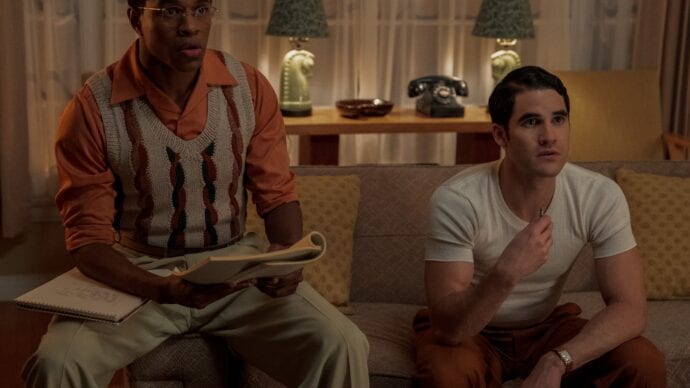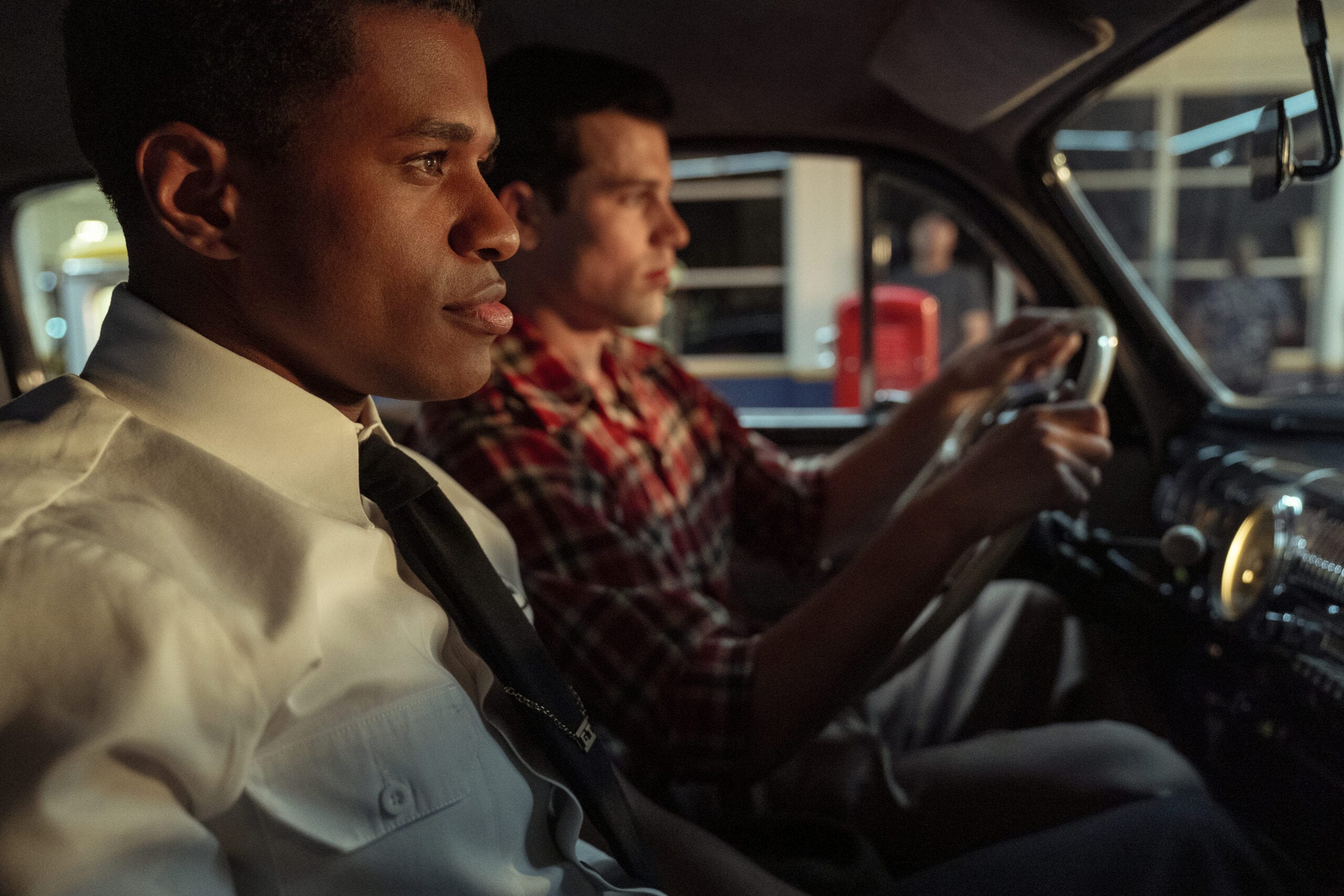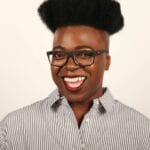Every actor wishes for their big break, hoping that some auteur will pluck them out of obscurity, give them a role worthy of their perceived talent and set them on a path to fame and fortune. But Jeremy Pope, one of the stars of Ryan Murphy’s new limited series Hollywood, didn’t need the prolific producer’s blessing to guarantee success. (Though I’m sure he’s happy to have it!) After all, his talents had already landed him on Broadway, with back-to-back debuts in Tarell Alvin McCraney’s Choir Boy and the Temptations jukebox musical Ain’t Too Proud, no less. During the week of the 2019 Tony Awards—in which Pope was nominated for both of his stage performances (the first Black man to be so)—the Orlando native was asked to self-tape an audition for Murphy’s then-unannounced new Netflix project about the Golden Age of Hollywood. “I was like, ‘I don’t have time. I’m trying to stay alive and get through these eight shows a week and this gruesome schedule,’” he recalls. Pope forced himself to self-tape anyway, despite little information to go on. “I knew [the character’s] name was Archie and he was a Black aspiring screenwriter,” he says. “That’s all there was.” The next day, Pope was told he booked the role and that Murphy wanted to meet with him. That meeting is where Pope found out the extent of what he had signed on for—a perfect entrée into the film and TV industry for any Black queer artist such as himself. A purposefully inspiring rewriting of history, Hollywood answers the question of what the industry might look like if those historically on its margins were given the power. It follows Avis Amberg (icon Patti LuPone), the aging wife of a studio executive who gets the chance to produce her own movie directed by Raymond Ainsley (Darren Criss), who is half-Asian. That film, written by Pope’s gay character Archie Coleman, stars Ainsley’s Black girlfriend Camille Washington (Laura Harrier). Mixed into this fictional narrative are references to real-life happenings of the period, including a gas station that masked a sex worker ring (à la tales documented by the late Scotty Bowers) and the closeted sexualities of actors like Rock Hudson and Tallulah Bankhead. Ahead of the series’ release, I spoke with Pope via phone about his Broadway beginnings, writing Black queer people into history and how James Baldwin inspired his Hollywood character.
Before we talk about the series, I want to talk about your interests before landing the role. Was doing TV and film always the goal?
I hoped to. I was a singer first. I grew up in the church singing and, in doing church plays and school plays, I developed my creativity. So while I started off in theatre, I did hope to be able to work on the screen. I’m so fortunate that it panned out that way, you know? I’m super excited that this is my first TV series debut. I’m very grateful to [Ryan Murphy] for taking a chance and a risk on me.
I’m not sure it was a risk though. I saw you in Ain’t Too Proud in L.A. before y’all went to Broadway and then I saw you in Choir Boy on Broadway. Your talent speaks for itself.
But that’s all I had done, and that was like my Broadway debut. I hadn’t worked in TV. So whatever he saw in the audition tape that I made, on top of the work that I was able to do in the theatre, it was somehow enough for him to go, “Let’s give this guy an opportunity and a chance.” I’m very excited and grateful to him for that. Especially because it wasn’t like the typical audition experience where there’s callback after callback and flying to L.A. to do a screen test or a chemistry test. We didn’t even do a FaceTime or anything.
Both of your Broadway gigs were specifically Black, in different ways. Hollywood, however, is a broader world where your Black character has to navigate a specific type of whiteness. Did that switch-up make you hesitant at all?
I’ve been so fortunate to work in theatre with Ain’t Too Proud and Choir Boy—projects that really stayed true to the Black experience and talk about it in a real way. I think sometimes, unfortunately, just through experience and things I’ve seen with Black people, you can become a token. Or you become the best friend or you’re in the ensemble or you’re just kind of meeting the quota of, “Look, we’re representing all walks of life, but you’re in the back.” But I’ve been fortunate to work on projects that fight against that. Once Ryan informed me about what this project was, that [my character] wasn’t just “Black aspiring writer” but that there was a real heartbeat folded into it, I was super excited to play this character. And that he was going to give me an opportunity to really talk about this period of time where it was complicated and tricky to be just a Black individual and, on top of that, an openly gay Black man.
What exactly made you excited about that?
Once I knew all the information from Ryan, I was super excited to portray this character because it looked like, for me being a Black artist, another opportunity for us, whether it be on stage or on screen.Whether we’re talking a fictional character in the ’40s or Jeremy Pope in 2020 or the young-whoever out there who’s looking and will go, “Yes, I want to do that. I want to be that.” [They’ll know] there is going to be room in the roles that are created for them to dig into and talk about something that feels very at home and personal.

Credit: Saeed Adyani/Netlifx
Some of the storylines in Hollywood are made up and others are rooted in truth. Were there any real-life reference points for your character specifically?
Being that Archie is fictional, I kind of had to create a backstory for him. I did a lot of research as far as what was happening in Black America: What we were doing, what we were fighting for, what we were listening to. And it was different in the North and in the South. So I created a narrative for myself. I put him parallel to James Baldwin, someone who was, I think, ahead of his time. Baldwin was creative and in tune with himself and comfortable. One thing that he did was he traveled and saw different parts of the world so he was able to come back with such a cultured experience. When Baldwin got back to America, he was just so baffled by how we were still fighting for equal rights. I kind of wanted to add that type of mentality and drive to Archie. But then I also went back to old Hollywood and saw what was happening with the Hattie McDaniels and all these different artists that were working.
The whole thinking behind the series is this idea of writing us into that history and imagining what the industry could look like if folks like us were given those opportunities back then. How do you think this show fits into the conversation we’ve been having in the industry about diversity and inclusion?
Well, Ryan does a good job of cheerleading people to come in, giving them opportunities, giving them chances. One person I got to work with so closely on this series was Janet Mock. She’s an incredible human being, incredible director and visionary actress. She directed, was in the writer’s room and very much part of the process of bringing this [series] to life. So again, we’re talking about this fictional fantasy world, but behind the scenes in the world of our creative team, they’re people of all walks of life creating this show. It’s built by the marginalized groups that weren’t thriving at that time.
What does that mean to you?
We have this wonderful opportunity to revive history. We’re talking about the glitz and glamorous part of Hollywood in the ’40s and ’50s, but also informing people of how special it could have been had you given equal rights to women and Black people and queer people. Because I do think in 2020, like you said, we’re still having those conversations, we’re still fighting to be seen and heard in a way that feels equal across the board. So if anything, I hope that this series feels hopeful and inspiring as we continue that fight. We are the generation that is going to continue to do that. We’re going to yell a little bit louder than maybe our generation did in the ’40s because we’ve seen the progress, we’ve seen the steps of how fulfilling it can be and how we can win those battles and those fights. This interview had been edited and condensed for clarity.


 Why you can trust Xtra
Why you can trust Xtra


